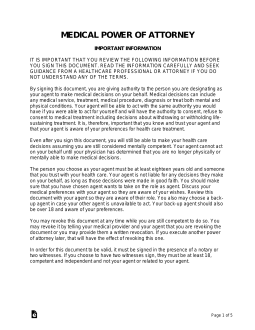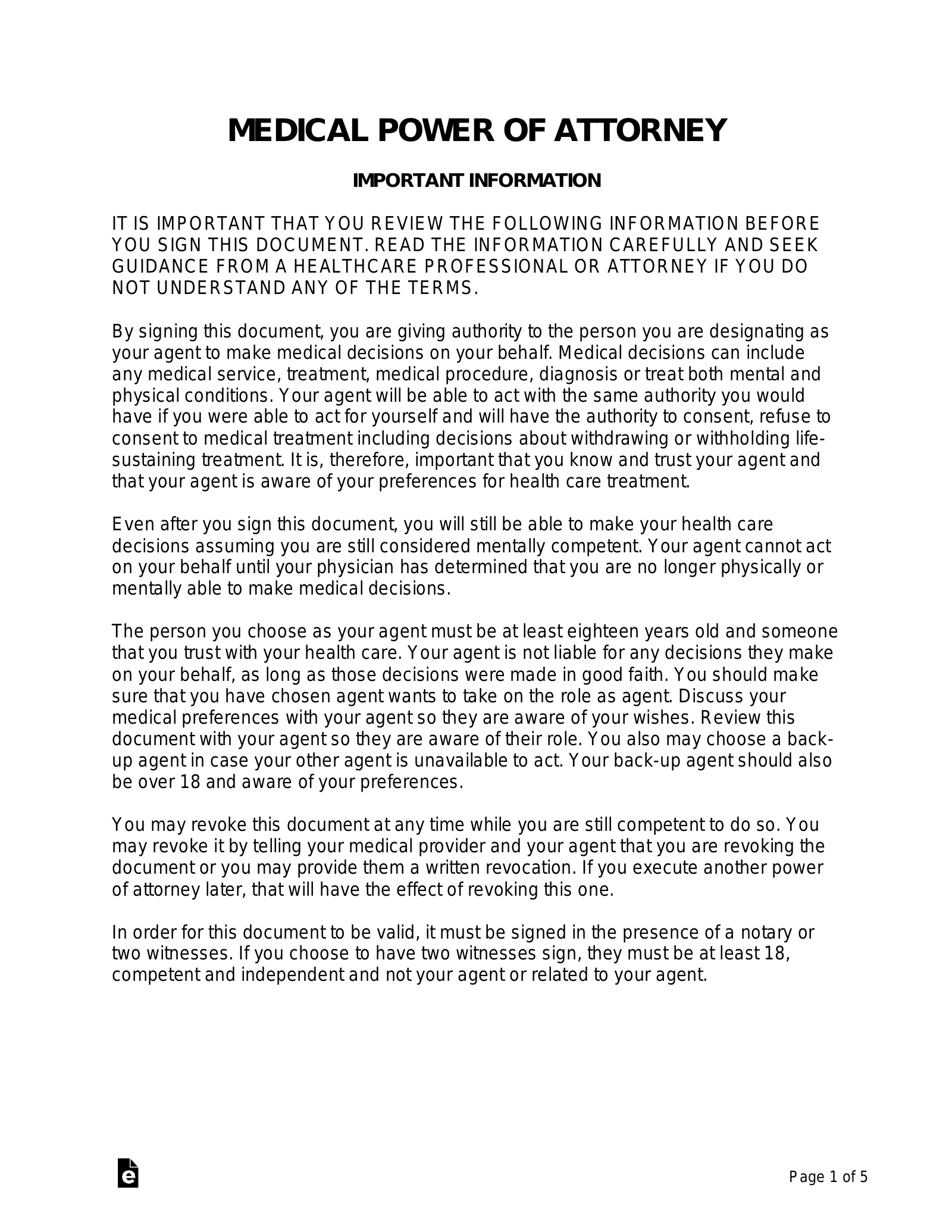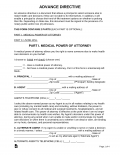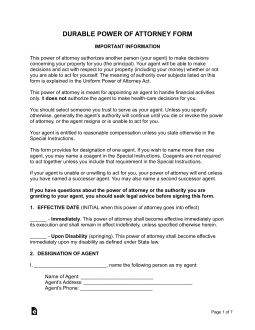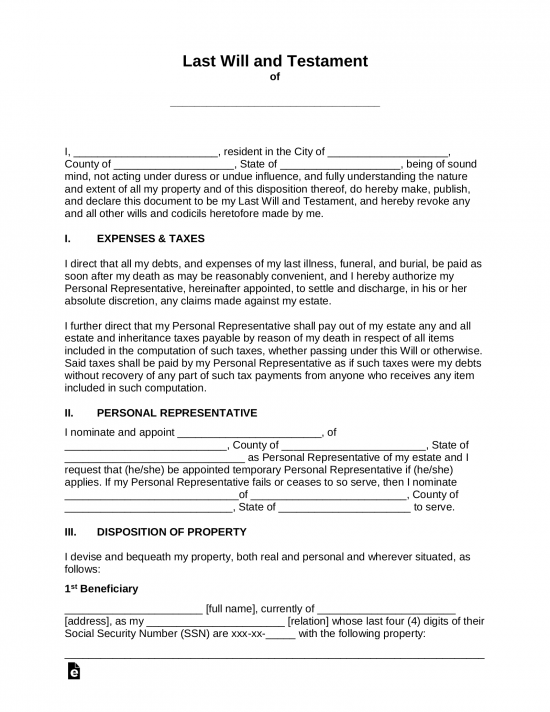Updated April 04, 2024
A medical power of attorney form allows a person (principal) to select an agent to make healthcare decisions on their behalf. The agent’s powers are effective after the principal becomes incapacitated and cannot make decisions on their own. This must be verified in writing by the attending physician.
Signing Requirements
View the State’s signing requirements where a power of attorney is signed. This commonly requires it to be notarized or signed by 2 adult witnesses.
Preferred Treatment Options
![]() When making decisions, the agent must follow the principal’s preferred treatment options as written in a living will.
When making decisions, the agent must follow the principal’s preferred treatment options as written in a living will.
If a living will is unavailable, an agent can make decisions they believe are in the principal’s best interest.
When can an Agent start making decisions?
A principal can make or revoke health-care decisions and medical instructions unless a physician, psychologist, court, or other authorized person or entity finds the principal lacks the capacity to do so. In that case, an authorized agent may undertake decision-making in accordance with the principal’s instructions.
Source: UHCDA Section 4(b)
By State
- Alabama
- Alaska
- Arizona
- Arkansas
- California
- Colorado
- Connecticut
- Delaware
- Florida
- Georgia
- Hawaii
- Idaho
- Illinois
- Indiana
- Iowa
- Kansas
- Kentucky
- Louisiana
- Maine
- Maryland
- Massachusetts
- Michigan
- Minnesota
- Mississippi
- Missouri
- Montana
- Nebraska
- Nevada
- New Hampshire
- New Jersey
- New Mexico
- New York
- North Carolina
- North Dakota
- Ohio
- Oklahoma
- Oregon
- Pennsylvania
- Rhode Island
- South Carolina
- South Dakota
- Tennessee
- Texas
- Utah
- Vermont
- Virginia
- Washington
- Washington D.C.
- West Virginia
- Wisconsin
- Wyoming
Table of Contents |
What is a Medical Power of Attorney?
A medical power of attorney (MPOA) is an official document that designates an agent or attorney-in-fact to make healthcare decisions on the principal’s behalf. A dispute on whether the principal can make their own decisions will only go into effect after a licensed physician has deemed the principal incapacitated.
It’s recommended for anyone making a medical power of attorney to also create a living will, which allows them to outline their treatment preferences for an agent to follow.
Medical POA vs. Living Will
A medical power of attorney lets a person select their preferred treatment options with the use of an agent to carry out their wishes. The agent will have full authority to make any type of decision to prolong or withdraw life-sustaining treatment.
VS.
A living will allows a person to select their preferred treatment options without the use of an agent. A living will directs medical staff to prolong or withdraw life-sustaining treatments depending on their condition.
Statutory Forms
Signing Requirements
| STATE | SIGNING REQUIREMENTS | LAWS |
|---|---|---|
| Alabama | Two (2) Witnesses | § 22-8A-4(c)(4) |
| Alaska | Notary Public or Two (2) Witnesses | AS 13.52.010(b) |
| Arizona | Notary Public or One (1) Witness | § 36-3221(A)(3) |
| Arkansas | Notary Public or Two (2) Witnesses | § 20-6-103(c) |
| California | Notary Public or Two (2) Witnesses | § 4701(e) |
| Colorado | No law (Notary Public recommended) | |
| Connecticut | Two (2) Witnesses | § 19a-575 |
| Delaware | Two (2) Witnesses | § 2503(b)(1)(d) |
| Florida | Two (2) Witnesses | § 765.202(1) |
| Georgia | Two (2) Witnesses | § 31-32-5 |
| Hawaii | Notary Public and Two (2) Witnesses | § 327E-3(1) |
| Idaho | No law (Notary Public recommended) | § 39-4510 |
| Illinois | One (1) Witness | 755 ILCS 45/4-5.1 |
| Indiana | Notary Public or Two (2) Witnesses | IC § 16-36-7-28 |
| Iowa | Notary Public or Two (2) Witnesses | § 144B.3(b) |
| Kansas | Notary Public and Two (2) Witnesses | § 58-632 |
| Kentucky | Notary Public or Two (2) Witnesses | § 311.625(2) |
| Louisiana | Two (2) Witnesses | § 224 (A) |
| Maine | Two (2) Witnesses | § 5-803(2) |
| Maryland | Two (2) Witnesses | § 5–603 |
| Massachusetts | Two (2) Witnesses | § 201D-2 |
| Michigan | Two (2) Witnesses | § 700.5506(4) |
| Minnesota | Notary Public or Two (2) Witnesses | § 145C.03(5) |
| Mississippi | Notary Public or Two (2) Witnesses | § 41-41-205(2) |
| Missouri | Notary Public | § 404.705(3) |
| Montana | Two (2) Witnesses | § 50-9-103 |
| Nebraska | Notary Public or Two (2) Witnesses | § 30-3404(5) |
| Nevada | Notary Public or Two (2) Witnesses | NRS 162A.790 |
| New Hampshire | Notary Public or Two (2) Witnesses | § 137-J:14 |
| New Jersey | Notary Public or Two (2) Witnesses | § 26:2H-56 |
| New Mexico | Two (2) Witnesses | § 24-7A-4 |
| New York | Two (2) Witnesses | PBH § 2981(2) |
| North Carolina | Notary Public and Two (2) Witnesses | § 32A-16A(3) |
| North Dakota | Notary Public or Two (2) Witnesses | § 23-06.5-05(d) |
| Ohio | Notary Public or Two (2) Witnesses | § 1337.12(1)(b) |
| Oklahoma | Two (2) Witnesses | 63 O.S. § 3101.4(A) |
| Oregon | Notary Public or Two (2) Witnesses | § 127.515(2) |
| Pennsylvania | Two (2) Witnesses | § 5452(b)(2) |
| Rhode Island | Notary Public or Two (2) Witnesses | § 23-4.10-2(9) |
| South Carolina | Notary Public and Two (2) Witnesses | § 62-5-517 |
| South Dakota | Notary Public or Two (2) Witnesses | § 34-12D-2 |
| Tennessee | Notary Public or Two (2) Witnesses | § 34-6-203(a)(3) |
| Texas | Notary Public or Two (2) Witnesses | § 166.154 |
| Utah | One (1) Witness | § 75-2a-107(c) |
| Vermont | Two (2) Witnesses | § 9703(b) |
| Virginia | Two (2) Witnesses | § 54.1-2983 |
| Washington | Notary Public or Two (2) Witnesses | § 70.122.030 |
| West Virginia | Notary Public and Two (2) Witnesses | § 16-30-4(a) |
| Wisconsin | Two (2) Witnesses | § 155.10(1)(c) |
| Wyoming | Notary Public or Two (2) Witnesses | § 35-22-403(b) |
How to Get Medical POA (4 steps)
1. Select Your Agent
 The agent that you select will have the responsibility of making your decisions based on your healthcare situation. Therefore, it’s recommended to select a person you trust and is aware of your basic medical history (such as heart conditions, medication, allergies, etc.)
The agent that you select will have the responsibility of making your decisions based on your healthcare situation. Therefore, it’s recommended to select a person you trust and is aware of your basic medical history (such as heart conditions, medication, allergies, etc.)
- Successor (2nd) Agent – An individual selected only if the primary agent is not able to fulfill their duties. Co-agent authority is not usually allowed; it must be the decision of one person.
- Compensation – The principal has the option to set up compensation for the agent selected for lodging, food, and travel costs.
2. Agent’s Decisions
 The decisions you give your agent related to your healthcare are up to you. You can allow your agent to make any type of decision that presents itself or you could limit your agent to only certain types of decision-making. The more detailed you are as to what your agent can and cannot do will enhance the medical staff on your intentions.
The decisions you give your agent related to your healthcare are up to you. You can allow your agent to make any type of decision that presents itself or you could limit your agent to only certain types of decision-making. The more detailed you are as to what your agent can and cannot do will enhance the medical staff on your intentions.
- Example – Requesting the agent to refuse life support if there is little to no chance of a full recovery.
The following powers of the agent should be written:
- Surgical treatments
- Nursing home treatment/care
- Hospitalization
- Medical treatment
- Psychiatric treatment
- Homestay care
- Organ donation
- End-of-life decisions
3. Attach a Living Will
 A living will is highly recommended to be attached to any medical power of attorney. In addition to having someone speak on one’s behalf, a living will outlines a person’s end-of-life treatment selections.
A living will is highly recommended to be attached to any medical power of attorney. In addition to having someone speak on one’s behalf, a living will outlines a person’s end-of-life treatment selections.
For example, if a person should become incapacitated with no chance of a cure, they can select to withhold life-sustaining methods that would keep them medically alive. In addition, it allows the selection of organ donation and other post-death options.
4. Sign and Complete
 The principal and agent must sign in accordance with their respective state signing laws. In most cases, the form may be signed in the presence of two witnesses or a notary public, sometimes both. After this has been legally authorized, the document becomes valid for use. The principal must be thinking freely during the creation of this form.
The principal and agent must sign in accordance with their respective state signing laws. In most cases, the form may be signed in the presence of two witnesses or a notary public, sometimes both. After this has been legally authorized, the document becomes valid for use. The principal must be thinking freely during the creation of this form.
The agent should carry an original copy of their form and will most likely need to present it during every occurrence. It is recommended to give a copy of this form to your primary care physician.
Sample
MEDICAL POWER OF ATTORNEY
1. APPOINTMENT OF HEALTH CARE AGENT
I, [PRINCIPAL NAME] of [ADDRESS], City of [CITY], State of [STATE] (HEREINAFTER known as the “Principal”) hereby appoint, [AGENT NAME] of [ADDRESS], City of [CITY], State of [STATE] (HEREINAFTER known as the “Agent”) as my Agent to make any and all medical decisions on my behalf, except to the extent I limit those decisions in this document. This power of attorney takes effect if my doctor certifies in writing that I can no longer make my own health care decisions. My agent can be reached at the following contact information:
Home Phone:[PHONE] Work Phone: [PHONE]
Cell Phone: [PHONE] E-Mail: [EMAIL]
2. LIMITATIONS OF MY AGENT
My agent is authorized to make all medical decisions on my behalf EXCEPT for the following: [LIST LIMITATIONS]
3. APPOINTMENT OF ALTERNATE AGENT
If my agent appointed above is unable or unwilling to serve as my agent, I appoint the following person(s) to serve as agents in the order set forth below with the authority to make health care decisions on my behalf as provided herein:
a. First Alternate Agent
Name: [NAME] Address: [ADDRESS] Phone: [PHONE]
b. Second Alternate Agent
Name: [NAME] Address: [ADDRESS] Phone: [PHONE]
4. ORIGINAL AND COPIES OF THIS DOCUMENT
The original document is/will be filed in the following place: [LOCATION]
I have/will provide copies of my medical power of attorney to the following: [NAME(S)]
5. DURATION
Unless stated otherwise herein, this document shall remain in effect until I revoke it. I understand that I cannot revoke this document during the time I am considered incompetent to make my own decisions.
(If applicable Initial and Check)
________ ☐ (OPTIONAL) This power of attorney shall expire on [DAY] of [MONTH], [YEAR].
6. PRIOR MEDICAL POWER OF ATTORNEY
By signing this document, I hereby revoke any and all prior medical powers of attorney that I may have executed.
7. EXECUTION
(YOU MUST DATE AND SIGN THIS POWER OF ATTORNEY. YOU MAY SIGN IT AND HAVE YOUR SIGNATURE ACKNOWLEDGED BEFORE A NOTARY PUBLIC
OR
YOU MAY SIGN IT IN THE PRESENCE OF TWO COMPETENT ADULT WITNESSES NOT RELATED BY BLOOD OR MARRIAGE.)
SIGNATURES
I /We hereby execute this document on [DAY] of [MONTH], [YEAR] in the City of [CITY], State of [STATE].
Principal’s Signature: _____________________ Print Name: ______________________
Agent’s Signature: _____________________ Print Name: ______________________
1st Alt. Agent’s Signature: ____________________ Print Name: ______________________
2nd Alt. Agent’s Signature: ____________________ Print Name: ______________________
NOTARY ACKNOWLEDGMENT
STATE OF [STATE]
[COUNTY] County, ss.
On this [DAY] of [MONTH], [YEAR], before me appeared [NAME], as Maker of this Medical Power of Attorney who proved to me through government-issued photo identification to be the above-named person, in my presence executed foregoing instrument and acknowledged that (s)he executed the same as his/her free act and deed.
Notary Public: _____________________
Print Name: _____________________
My commission expires: _____________________
(seal)
WITNESS STATEMENT AND ACKNOWLEDGMENT
I am not the person appointed as agent or successor agent in this medical power of attorney. I am not related to the maker of this document by blood or marriage. I am not entitled to any portion of the maker’s estate, nor do I have any claim against the maker’s estate. I am not the attending physician of the maker or an employee of the attending physician. I am not involved in providing direct patient care to the maker and am not an officer, director, partner, or business office employee of the health care facility or of any parent organization of the health care facility.
SIGNATURE OF FIRST WITNESS
Signature: ________________________________________________
Print Name: ___________________________________ Date: __________
Address: __________________________________________________
SIGNATURE OF SECOND WITNESS
Signature: ________________________________________________
Print Name: ___________________________________ Date: __________
Address: __________________________________________________
For the comprehensive document, please download the free form or hit “create document.”
Related Forms
Download: PDF, MS Word, OpenDocument
Download: PDF, MS Word, OpenDocument
Download: PDF, MS Word, OpenDocument

